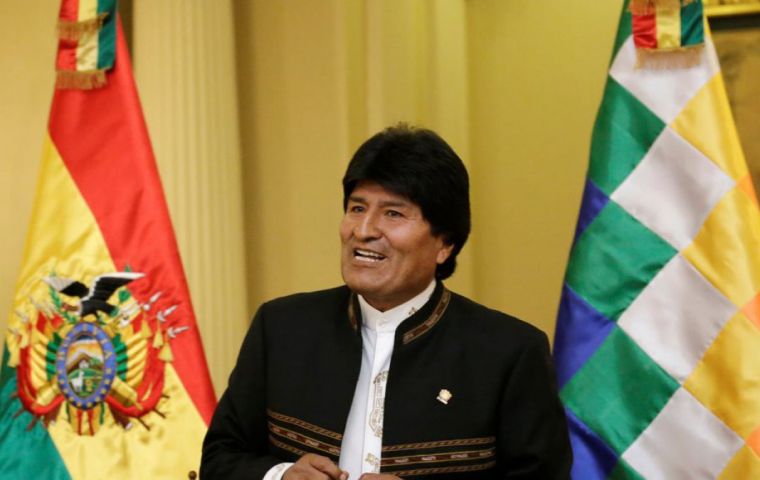MercoPress. South Atlantic News Agency
International Court to listen arguments from Bolivia and Chile on the disputed access to the Pacific
 “We are going to make history, with the truth, with the law. We are convinced that justice for Bolivia will be achieved”, said president Morales.
“We are going to make history, with the truth, with the law. We are convinced that justice for Bolivia will be achieved”, said president Morales.  Piñera anticipated he will be going to Government House at 05:45, Chilean time, which is when the delegations will begin presenting their arguments in The Hague.
Piñera anticipated he will be going to Government House at 05:45, Chilean time, which is when the delegations will begin presenting their arguments in The Hague. Delegates from Bolivia and Chile will head to the International Court of Justice in The Hague on Monday morning, where they will present their arguments over a disputed 380 kilometer coastline on the Pacific Ocean.
Relations between Bolivia and Chile have been historically strained over the territory dispute, which was instigated after Bolivia was defeated in the War of the Pacific 1879/1883, leaving the country landlocked. Bolivia's ally Peru also lost some southern territory to Chile, which occupied Lima for a couple of years.
It remains unclear which way the ICJ will rule when it hands down a decision later this year.
For Bolivia, the only landlocked country in the world to maintain a navy, the disputed territory will grant access to the sea to enhance its exports of natural gas and minerals. For Chile, the world’s largest exporter of copper, the region contains some of its biggest mines. With economic prosperity on the line, any decision will likely be intolerable for one of the parties. Indeed, with no avenue for an appeal, expect relations between Bolivia and Chile to be further strained regardless of which way the court rules.
The Bolivian delegation is headed by president Evo Morales, and includes two former presidents, the foreign and justice ministers and the chairs of the Lower House and the Senate, plus the team of Bolivian and international lawyers taking the case.
“We are going to make history, with the truth, with the law. We are convinced that justice for Bolivia will be achieved”, said president Morales.
From Santiago, president Sebastian Piñera said he had full confidence the International Court of The Hague will abide by international law, adding that “the presence of the Bolivian president will not affect what has to be done juridical”.
Piñera anticipated he will be going to Government House at 05:45, Chilean time, which is when the two delegations will begin presenting their arguments in The Hague.
Bolivia will make its presentations on Monday and Tuesday, while Chile will do the same on Thursday and Friday. The following week the two sides will have a one day to round up their positions, Bolivia Monday and Chile Wednesday.
Source: Simon Papagiorcopulo - Foreign Brief




Top Comments
Disclaimer & comment rules-

-

-

Read all commentsEdgar acting the idiot as usual.
Mar 19th, 2018 - 10:59 pm +3Edgarito, infórmate
https://en.wikipedia.org/wiki/War_of_the_Pacific
”In February 1878, Bolivia imposed a new tax on a Chilean mining company (“Compañía de Salitres y Ferrocarril de Antofagasta”, CSFA) despite Bolivian express warranty in the 1874 Boundary Treaty that it would not increase taxes on Chilean persons or industries for twenty-five years. Chile protested and solicited to submit it to mediation, but Bolivia refused and considered it a subject of Bolivia’s courts. Chile insisted and informed the Bolivian government that Chile would no longer consider itself bound to the 1874 Boundary Treaty if Bolivia did not suspend enforcing the law. On February 14, 1879 when Bolivian authorities attempted to auction the confiscated property of CSFA, Chilean armed forces occupied the port city of Antofagasta..........In 1884, Bolivia signed a truce that gave control to Chile of the entire Bolivian coast, the province of Antofagasta, and its valuable nitrate, copper and other mineral deposits. A treaty in 1904 made this arrangement permanent. Chile built a railroad connecting the Bolivian capital of La Paz with the port of Arica and guaranteed freedom of transit for Bolivian commerce through Chilean ports and territory.”
“Bolivia, the only landlocked country in the world to maintain a navy”
Mar 20th, 2018 - 01:25 am +1Except it isn't.
There are Azerbaijani and Kazakhstani navies and Turkmenistani naval forces, operated by the Border Guard Service, in the Caspian Sea; Switzerland has a Lakes flotilla, technically part of the army, which patrols Lakes Geneva, Lucerne, Lugano, Maggiore and Constance and the Lao People's Navy operates inland on the Mekong River.
Morales can just go and pound sand!
Mar 20th, 2018 - 04:52 pm +1Commenting for this story is now closed.
If you have a Facebook account, become a fan and comment on our Facebook Page!